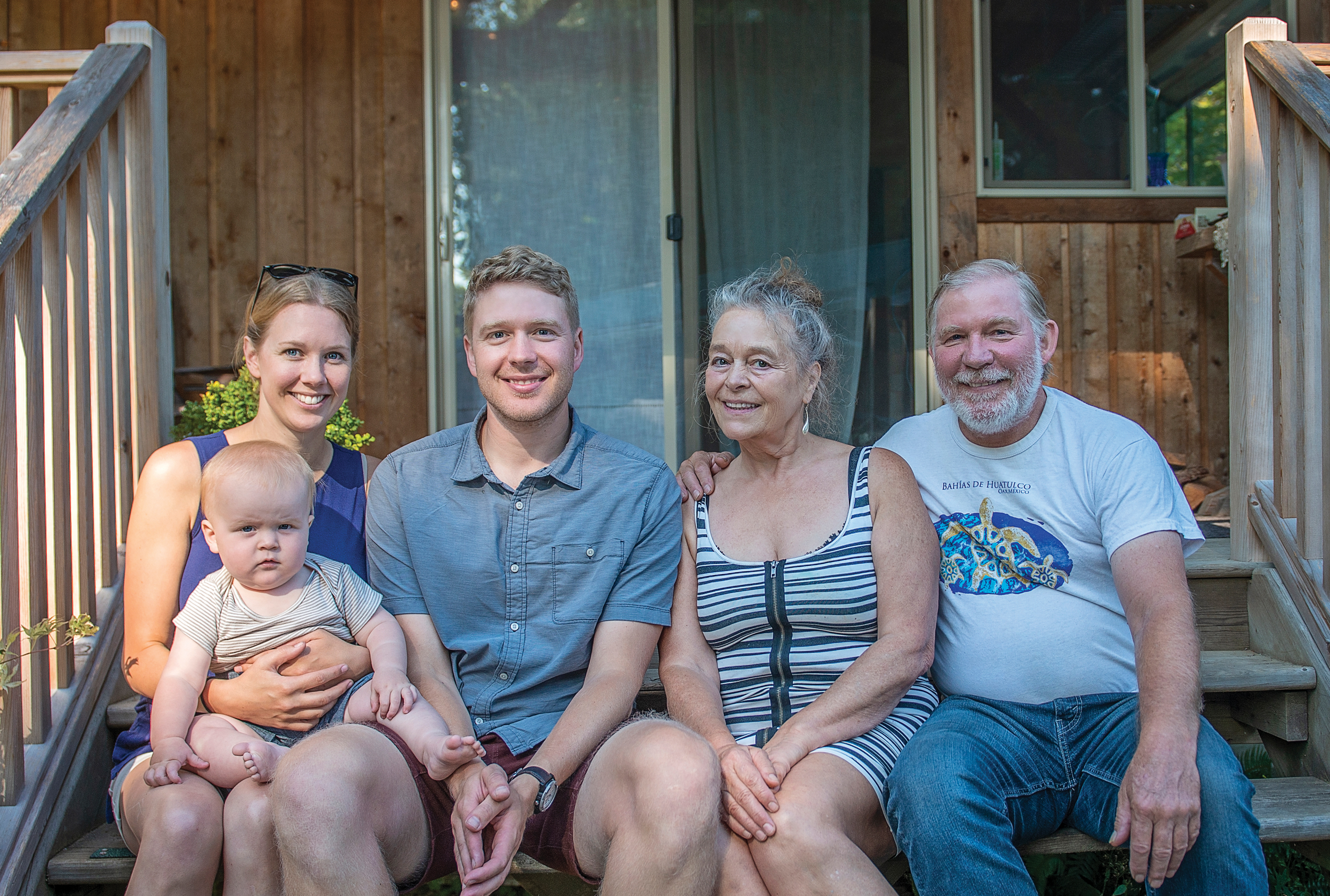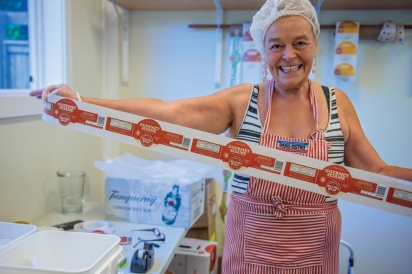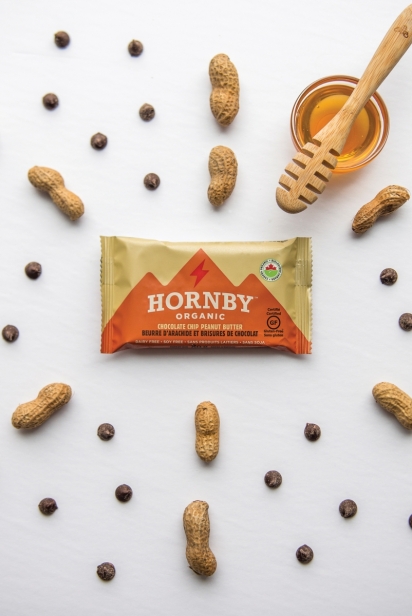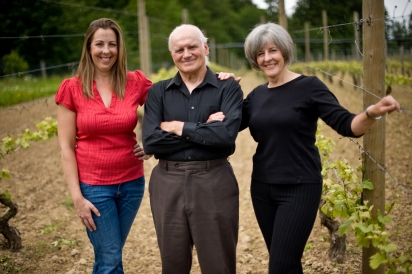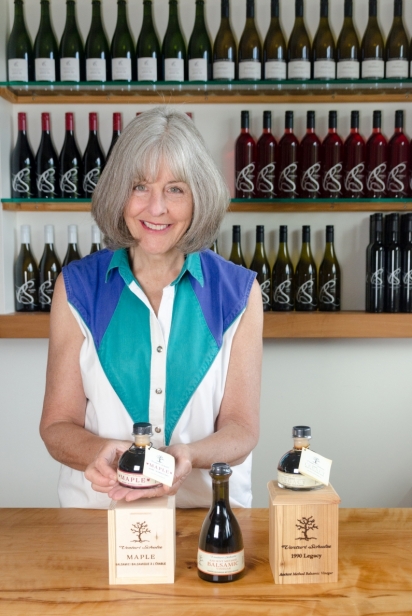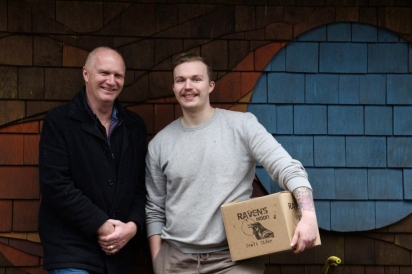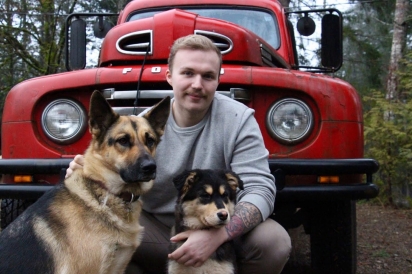Passing the Torch
For so many Vancouver Island makers and farmers, their work is a labour of love, passion and focused intent, rather than merely an effort to make a living and pay the bills. And when love and passion are so intricately tied to a process, the question inevitably arises: who will carry the flame into the future?
In some cases, no one steps forward, and once owners retire or pass on, their life’s work is lost. But for some Islanders, their passion project becomes a family legacy, with children picking up the reins and infusing the business with the energy, ideas and direction needed to help it thrive for another generation.
Hornby Organic
Such is the case with Hornby Organic. Based in the fertile Comox Valley north of Nanaimo, the company owned by Irah Vet and Cayleigh Rees makes organic, gluten-free energy bars that are quickly expanding the company’s reach from Western Canada right across the country.
Vet grew up watching his parents, Trish and Mick Vet, launch a fledgling business from Hornby Island: Hornby Energy Balls. “Mom started the energy balls in our home kitchen, then began selling in a few local grocery stores and eventually built an addition to our house where she could work.”
The balls are comprised of oats, honey and peanut butter, dense nutrient-rich foods that were an immediate hit with customers. In his early 20s Vet volunteered to build a website for his parents’ business and immediately began receiving emails from customers. “I sensed there was demand for more of the product,” he recalled, “and I decided I’d like to expand the business.”
Vet was no stranger to entrepreneurism, and though his parents were not quite ready to retire and hand the company over, he recognized that bars rather than balls would improve production and shipping and help drive a successful expansion. So he and Rees transitioned his mother’s recipe into a bar format and launched Hornby Organic from the garage of his parents’ home in 2013.
Demand grew quickly, and by 2017 they had outgrown the garage and moved to a larger warehouse in Courtenay. Today the pair make up to 20,000 bars each week: four varieties with a peanut butter base, and three others using sesame seed butter, sunflower seed butter and pumpkin seed butter. The bars are sold primarily in Western Canada in natural food stores and Mountain Equipment Co-op, but expansion across Canada is imminent.
“We still work closely with my parents, and they’re excited about what we’re doing,” says Rees. “In the beginning they were nervous, knowing the challenges of a food business and how much work was involved. But they’ve seen the success we’ve had, and they are proud.”
Irah and Cayleigh have plans for different variations of bars and other food products in the future but are heavily focused on meeting their current demand and ensuring the consistency of a high-quality product. These days the couple returns to Hornby Island as tourists rather than residents, a refreshing change, says Irah. “When we worked on Hornby we didn’t get to enjoy its beauty as much as we do now!”
Venturi Schulze
Giordano and Marilyn Venturi are the founders of Venturi Schulze, a family owned farm in Cobble Hill near Duncan where they make wine and balsamic vinegar. Marilyn’s daughter, Michelle Willcock Schulze, 42, spent much of her childhood wandering in the vineyard and has fond memories of gathering around her stepfather’s kitchen table for sumptuous, boisterous meals. In 1995, straight out of high school, she surprised the family by announcing she wanted to join the winery.
At the time the business was not profitable and couldn’t afford to pay her. Instead, in exchange for room, board and partnership, Willcock Schulze agreed to start an apprenticeship where she could learn everything her parents knew. “They gave me assignments every week that involved blind tastings, research on where certain varieties of grapes were grown, soil preparation and vine planting and pruning,” she recalls. “At that time there was no Canadian institution where you could study viticulture, but I got a pretty good education nonetheless.”
Fast forward 24 years and Willcock Schulze is an indispensable part of the winegrowing business. She loves her work and will eventually lead the business into the future. “Our balsamic vinegar is doing very well, and there are lots of opportunities to move it worldwide.
“But as a second generation you start to look at things more from a financial perspective, and that can create conflict sometimes. Venturi Schulze has turned a corner financially, but we’re still not that profitable, which means that working on this farm is a lifestyle choice.” She supplements her farm work by helping her partner with his business, raptor breeding and export, in Metchosin, a half hour south of the winery.
Raven's Moon Craft Cider
Quinn Ehrler grew up on the family farm in Courtenay, where his parents operated Blue Moon Winery from 2002. Passionate about food, he worked at Locals Restaurant in Courtenay and studied culinary arts after high school. But his attention was piqued when his father, George Ehrler, started Raven's Moon Craft Cider in 2012.
As a fan of food, flavours and fermentation, Ehrler Jr. saw a unique opportunity to play and experiment while receiving valuable public feedback. He joined the business as a partner and head brewer at the age of 19, and the experimentation began: with bourbon, honey spice, chai tea and other unique flavours.
Today father and son have 14 varieties of cider that are sold across British Columbia, Alberta and the Northwest Territories. “All the apples we use are grown in the Comox Valley, and we love supporting local and collaborating with different businesses,” he says.
“For example, we collaborate with the Wayward Distillation House using their spiced honey liqueur, and our tea-infused cider uses tea from the Hornby Island Tea Company. We’re releasing a chai apple cider soon and an Ortega-infused cider, and we’re always playing with flavours and experimenting.”
Quinn wants to keep brewing cider while expanding the reach of Raven’s Moon more, possibly into the American market. George runs the books and helps taste-test new ciders, while Quinn focuses on brewing and running the tasting room in the summertime. “Visitors who stop in get face-to-face time with me, the guy who brews the cider,” he says proudly. Always experimenting, he welcomes ideas and feedback from customers, hoping to fuel his next innovative cider offerings and push his creativity in new directions.


